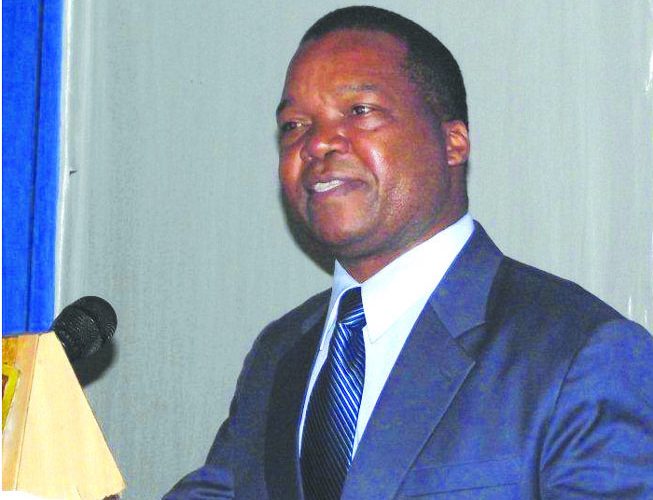


 INDUSTRIALISTS and bankers this week welcomed the appointment of CBZ Holdings chief executive officer, John Mangudya, as the Reserve Bank of Zimbabwe (RBZ) governor although critics said the challenges facing the country’s fragile economy would present the new central bank chief with the biggest test of his career.
INDUSTRIALISTS and bankers this week welcomed the appointment of CBZ Holdings chief executive officer, John Mangudya, as the Reserve Bank of Zimbabwe (RBZ) governor although critics said the challenges facing the country’s fragile economy would present the new central bank chief with the biggest test of his career.
They said it was not so much about the credentials of the new RBZ governor, but rather the operating environment whose odds were currently staked against a properly functioning central bank.
Witness Chinyama, a Harare-based economist, said it was unlikely Mangudya would turn the country’s fortunes in the absence of support from government. Chinyama said the same issues that shook the central bank during Gideon Gono’s tenure still subsisted, and these were unlikely to help Mangudya’s cause.
“The only function left for the Reserve Bank at the moment is that of regulation, but we know the central bank is not adequately capitalised to undertake that role,” said Chinyama.
“He (Mangudya) might have the skills, but he will be undermined by lack of resources. A weak central bank is very risky to financial markets,” Chinyama said.
Currently, because of lack of resources, the central bank has been unable to conduct on-site inspection of banking institutions, resulting in acts of delinquency going unnoticed only to emerge after the banks become insolvent.
The central bank has also been unable to undertake open market operations because the institution is not adequately capitalised and has not been supported by central government, itself grappling with a liquidity crunch, said Chinyama.
Open market operations refer to the central bank buying or selling government bonds on the open market in order to expand or contract the amount of money in the banking system. Open market operations are therefore one of the primary means of implementing monetary policy. Normally, these instruments are also used by banks as collateral for interbank lending.
Currently, the interbank market is dead because of the central bank’s inability to play its other crucial role of lender of last resort — providing the economy with funds when commercial banks cannot cover supply shortages.
However, through support from Afreximbank, government announced a facility to the tune of US$100 million for the RBZ to revive its lender-of-last-resort function. Finance Minister Patrick Chinamasa last week highlighted that the primary objective of the facility would be to unlock deposits held by surplus banks and make them available to those banks with short-term liquidity challenges. By so doing, he said, the liquidity lying idle would be used to stimulate the interbank market.
This is expected to boost the circulation of the money in the system, and alleviate the liquidity challenges in order to promote the proper functioning of the economy and the stability of the financial markets. The RBZ does not have the capacity to create necessary instruments to cover the banks with surplus cash so that they can lend to other banks experiencing deficits without risking their own depositors’ funds.
Because of default on loan repayments — the central bank is currently sitting on a US$1 billion creditor’s book — many institutions have been averse to buying instruments issued by the RBZ. To help create confidence in instruments banks would buy and use for interbank borrowing, Afreximbank has already pledged to issue “own name securities” to participating banks in exchange for collateral or securities from the banks acceptable to Afreximbank.
Still, the RBZ has a long way to go: Zimbabwe ditched its own currency in 2009 and adopted a multicurrency regime to escape runaway inflation. The country now has no currency of its own, and this has significantly exposed the RBZ’s ability to influence the economy and the markets. The primary goal of any central bank is to provide its country’s currency and price stability by controlling inflation.
As the regulatory authority of a country’s monetary policy, the central bank is the sole provider and printer of notes and coins in circulation. That role is no longer there for the central bank.
Tony Hawkins, a professor at the University of Zimbabwe and a board member at the RBZ, told Bloomberg this week: “Mangudya is a substantial figure and well-trained with lots of experience, but the governor’s job is seriously constrained by the dollar economy … Money supply is obviously out of the bank’s control, as are interest rates.”
Announcing Mangudya’s appointment by President Robert Mugabe in a local weekly this week, Chinamasa described him as “Keynesian economist who believes in discretionary fiscal and monetary policies”.
This appears to suggest that Mangudya would be amenable to aggressive economic intervention policies by the government as well as allowing his principal discretion in expenditure that could result in high budget deficits.
Government is currently grappling with cash problems that have resulted in its failure to pay civil servants their new salaries agreed in February. Highlighting the challenges faced by Mangudya, AfrAsia said in a market report for investors: “The new governor will take over a central bank hamstrung by debts and seriously undercapitalised to effectively enable it to perform its role as the lender of last resort and other important central bank functions.”
“While the move by government to assume the RBZ debt is commendable, the market remains skeptical about the ability of the government to provide US$200 million required for the recapitalisation of the central bank owing to the precarious government revenue status.”
newsdesk@fingaz.co.zw